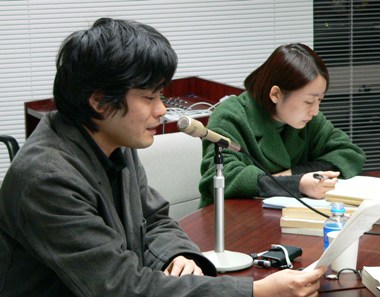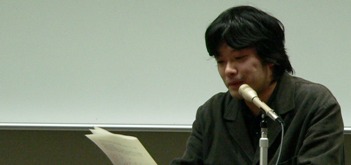Report : Maurice Blanchot and the Times
On the 13th of November, as part of Yasuo Kobayashi’s seminar “Times and the Unconscious”, Yuji Nishiyama, research assistant lecturer, made a presentation under the title “Maurice Blanchot and the times - From ‘the Book to Come’ towards ‘the Absence of the Book’”, based on his recent book Literature as Contestation – Solitude, Friendship and Community in Maurice Blanchot (Ochanomizu-shobo, 2007).
As the subtitle, “From ‘the Book to Come’ towards ‘the Absence of the Book’” shows, the focus of the presentation was on the specificity of Blanchot’s political activity as objection (from the opposition to the Algerian War to the May 1968) during the decade between 1958 and 1969, when the two respective texts were published. This specificity, characterized by “anonymity”, “fragmentariness” and “communality” could be discovered in the “Notes” at the beginning of The Infinite Conversation (1969), in the critique of “oeuvre” in “The Absence of the Book” or in the collections of fragments published afterward, consequently, the conclusion was that for Blanchot the political objection and the study of the “form” of the ecriture were performed, following the same course. Before addressing the main topic of his presentation, Nishiyama introduced to the audience the outline of Blanchot’s literary theory, dating from The Space of Literature (1955). The originality of Nishiyama’s view was in placing “plasticity” along with “impersonality” and “indefiniteness” as characteristic features of Blanchot’s “literary space”. “Plasticity” is a term from Catherine Malabou’s The Future of Hegel, translated by Nishiyama in 2005, but it foreshadowed the the question of “form” in political participation. Then, concrete examples of Blanchot’s political engagement were related to the characteristic features of his ecriture.
Kai Gohara, also specialist on Blanchot asked several questions after the presentation, including Blanchot’s consiousness not only of the times, but also of history, especially in relation to the term of “fragmentariness”., as well as on the complicated position the notion of “book (work)” had for the critic.
Yasuo Kobayashi, representative of the second generation of Blanchot scholars, intervened with a comment on Blanchot’s quest for the pulling forces at work during the experience of writing and its revelation in the collectivity of the masses in May 1968.
A question on Nishiyama’s use of “as” in the title of his book in relation to the indefinable nature of literature made a strong impression on the audience.
It remains to clarify the theoretical connection, beyond “analogy”, between literature and politics.
(Kai Gohara, Excerpted translation: Dennitza Gabrakova)









